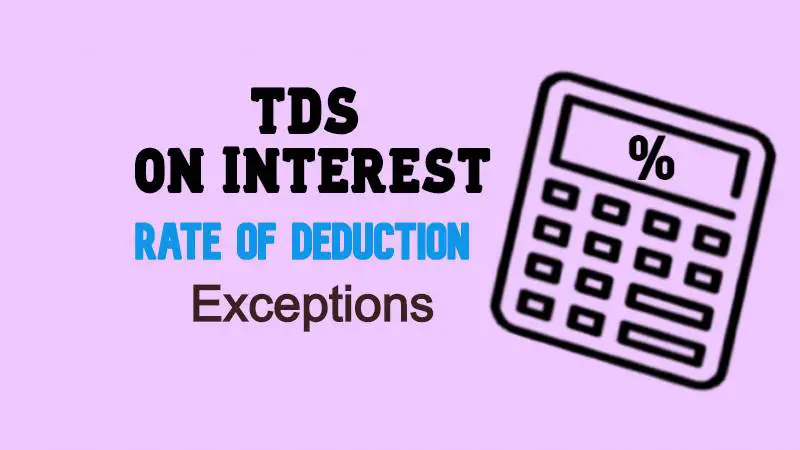Tax Deducted at Source (TDS) is a means of tax collected at the very source of income. Any company or person making a payment is required to deduct tax at the rates prescribed by the act within a specified period. A deductor is a person responsible for deducting tax. The person who receives the payment after the deduction of tax is called the deductee. “TDS on interest” is deductible at the Interest Income like fixed deposit and interest on unsecured loan but it does not include interest on securities.

Also Read:
Section 194A TDS on Interest
Section 194A of Income Tax Act deals with TDS on interest includes interest other than interest on securities like Interest on Fixed Deposits, Interest on Loans and Advances other than banks. Interest on securities is covered under Section 193 of the Income Tax Act.
TDS on interest is deducted when the interest income is payable to a resident person. Interest payable to a non-resident will be covered under section 195 of the income tax act.
Any person, other than individual or HUF is required to deduct TDS who is paying interest to a resident person. If such individual or HUF is subject to audit his accounts under section 44AB then he is also required to deduct TDS while paying Interest.
Examples of Interest covered under section 194A are:
- Fixed Deposit Interest
- Interest paid on Unsecured Loans
- Interest on Loan paid for Friends and Relatives.
Point of Time for Deduction of TDS on Interest
“TDS on Interest” is to be deducted by the deductor at the time of payment of such interest or at the time of credit to the account of the deductee whichever is earlier.
Any income by way of interest as aforesaid is credited to any account called “Interest payable account” or “Suspense account” or by any other name, in the books of account of the person who is liable to pay such income then TDS should be deducted.
TDS Payment Due Date: The deducted TDS amount should be deposited to the government within 7th of the succeeding month in case if TDS is deducted in the months April- February and on or before 30th April for the TDS deducted in the month of March.
Rate of Deduction of TDS on Interest
If the PAN is not furnished by the deductor then TDS is to be deducted at 20% instead of 10%.
No surcharge, education cess or SHEC shall be added to the above rates. Hence, tax will be deducted at source at the basic rate.
If a declaration is submitted under section 197A in Form 15G/15H by the recipient to the payer along with his PAN number then no tax is deducted or the rate is NIL.
The person responsible for making the payment may at the time of making any deduction, increase or reduce the amount to be deducted under this section for the purpose of adjusting any excess or deficiency arising out of any previous deduction or failure to deduct during the financial year.
Exceptions to Deduct TDS on Interest
The provisions of this section will not apply to a person if the aggregate amount of interest payable or credited during the financial year exceeds Rs.40,000 where the payer is
- Banking company or banking institution registered under Banking Regulations Act 1949.
- The cooperative company engaged in the banking business.
- Post office (under any scheme framed by the central government).
- Rs.5000 in any other case.
- From the Financial year 2018-19, no TDS will be deducted on interest earned by the senior citizens up to Rs.50,000. The interest amount earned should be out of deposits from banks, post office, Fixed deposit or recurring deposit schemes.
An important point to note is that the interest paid to the partners by the partnership firm is not covered under “TDS on Interest”. If “TDS on interest” is not deducted then interest will be levied at the rate of 1% per month from the date on which TDS was deductible till the date of actual deduction.
More to Read: